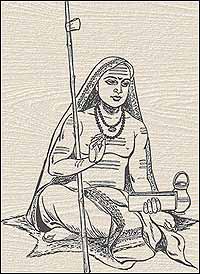|

|
Bondage and Freedom
136. By means of a trained mind, and thanks to your
faculty of understanding, experience in practice the true self of this
'I exist' in yourself, cross the ocean of Samsara's waves of birth and
death, and established in the nature of God, and achieve the goal (of
life).
137. Seeing 'This is me' in what is not really oneself, this is man's
bondage, the result of ignorance and the cause of the descent into the
pain of birth and death. It is because of this that one sees this unreal
body as real, and identifying oneself with it, feeds it and cares for it
with the senses, like a grub in its cocoon.
138. One who is confused by lack of clarity sees something which is
not there, like a man mistaking a rope for a snake through lack of
understanding, and experiencing great pain etc. from mistakenly taking
hold of it. So, my friend, hear this - Bondage is thinking that
something non-existent exists.
139. This obscuring power conceals the infinite glory of one's true
self which radiates with its indivisible, eternal and unified power of
understanding, like an eclipse obscures the sun's disk, and creates
darkness.
140. When he has lost sight of his true self, immaculate and
resplendent, a man identifies himself with his body out of ignorance.
Then the great so-called dispersive power torments him with its fetters
of continuous desire, hatred etc.
141. When a man has fallen to the state of being swallowed up by the
great shark of ignorance, he assumes to himself the various states
superimposed upon him, and in a pitiful state wanders rising and sinking
in the great ocean of Samsara.
142. Just as cloud formations, arising from the suns rays, obscure
the sun and fill the sky, so the sense of self-identity, arising from
one's true nature, obscures the existence of the true self and itself
fills experience.
143. Just as the thick clouds covering the sun on a bad day are
buffeted by cold, howling blasts of wind, so, when one's true nature is
obscured by deep ignorance, the strong dispersive power torments the
confused understanding with many afflictions.
144. It is from these powers that man's bondage has arisen. Confused
by them, he mistakes the body for himself and wanders in error.
145. The seed of the Samsara tree is ignorance, identification with
the body is its shoot, desire is its first leaves, activity its water,
the bodily frame its trunk, the vital forces its branches, the faculties
its twigs, the senses its flowers, the manifold pains arising from
various actions its fruit, and the bird on it is the individual
experiencing them.
146. Ignorance is the root of this bondage to what is not one's true
nature, a bondage which is called beginningless and endless. It gives
rise to the long course of suffering - birth, death, sickness, old age,
etc.
147. It cannot be destroyed by weapons, wind or fire, nor even by
countless actions - by nothing, in fact, except by the wonderful sword
of wisdom, sharpened by God's grace.
The Freeing of the Self
148. He who is devoted to the authority of the
scriptures achieves steadiness in his religious life, and that brings
inner purity. The man of pure understanding comes to the experience of
his true nature, and by this Samsara is destroyed, root and all.
149. One's true nature does not shine out when covered by the five
sheaths, material and otherwise, although they are the product of its
own power, like the water in a pool, covered with algae.
150. On removing the algae, the clean, thirst-quenching and
joy-inducing water is revealed to a man.
151. When the five sheaths have been removed, the supreme light
shines forth, pure, eternally blissful, single in essence, and within.
152. To be free from bondage the wise man must practise
discrimination between self and non-self. By that alone he will become
full of joy, recognising himself as Being, Consciousness and Bliss.
153. Just as one separates a blade of grass from its sheaths, so by
discriminating one's true nature as internal, unattached and free from
action, and abandoning all else, one is free and identified only with
one's true self.
Vivek Chudamani
- 1
| 2
| 3
| 4
| 5
| 6
| 7
| 8
| 9
| 10
| 11
| 12
| 13
|
|
